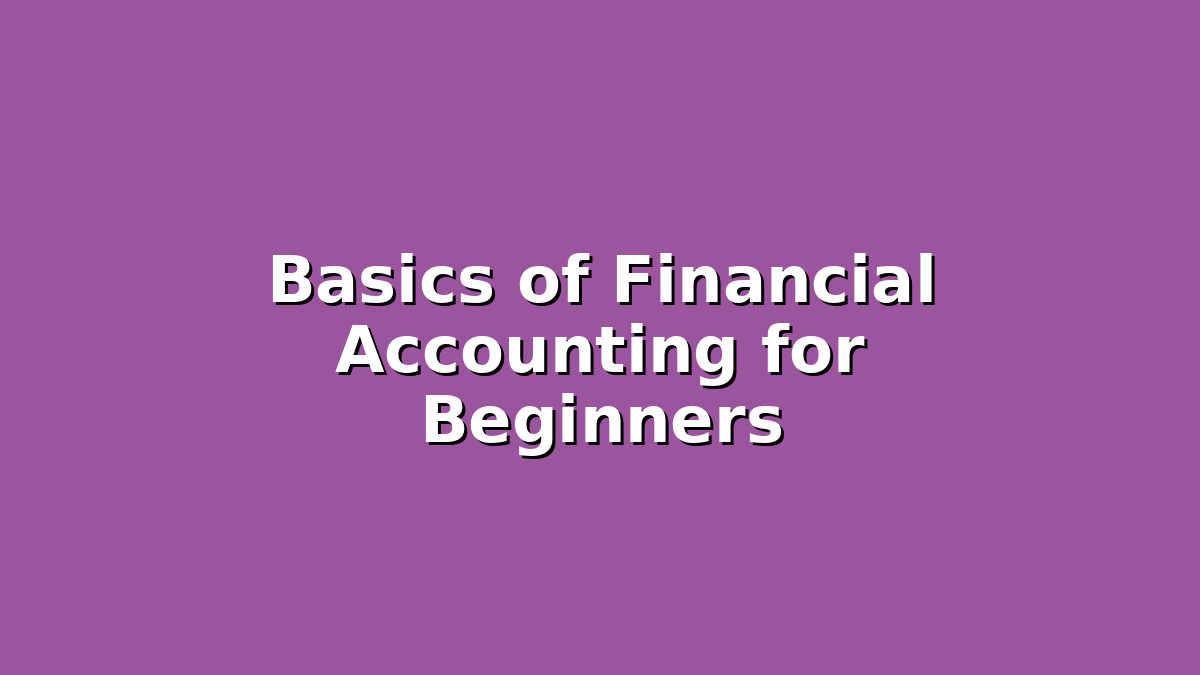Financial accounting is a fundamental subject for students pursuing business, commerce, or finance-related courses. Whether you’re preparing for exams or simply trying to get a solid grasp of the basics, understanding financial accounting is essential. It not only helps you decode the language of business but also equips you with skills to analyze financial information critically. If you’re feeling overwhelmed by the many terms, rules, and concepts, don’t worry! This guide will walk you through the basics of financial accounting and provide practical study tips to help you succeed.
Understanding the Core Concepts of Financial Accounting
At its heart, financial accounting is about recording, summarizing, and reporting the financial transactions of a business. The primary goal is to provide useful information to external stakeholders, such as investors, creditors, and regulatory bodies. This information is presented in financial statements like the balance sheet, income statement, and cash flow statement.
Key Terms Every Beginner Should Know:
– Assets: Resources owned by the business (e.g., cash, inventory, equipment).
– Liabilities: What the business owes to others (e.g., loans, accounts payable).
– Equity: The owner’s claim on assets after liabilities are settled.
– Revenue: Income earned from selling goods or services.
– Expenses: Costs incurred to generate revenue.
– Double-entry bookkeeping: Every financial transaction affects at least two accounts, maintaining the accounting equation: Assets = Liabilities + Equity.
Study Tip: Create flashcards with these terms and their definitions. Regularly quiz yourself to build strong foundational knowledge.
Mastering the Accounting Cycle
The accounting cycle is a step-by-step process used to record and process financial transactions during an accounting period. Understanding this cycle is crucial for exam success and practical application.
The Main Steps Include:
1. Identifying Transactions: Recognize business activities that involve money.
2. Recording Transactions: Use journals to record transactions chronologically.
3. Posting to Ledger: Transfer journal entries to respective accounts in the ledger.
4. Trial Balance Preparation: Ensure that total debits equal total credits.
5. Adjusting Entries: Make necessary adjustments for accrued or deferred items.
6. Financial Statement Preparation: Compile income statements, balance sheets, and cash flow statements.
7. Closing Entries: Reset temporary accounts for the next accounting period.
Study Tip: Practice by working through sample transactions and going through the cycle. Use accounting software demos or worksheets to get hands-on experience. Repetition will build your confidence and speed.
Developing Effective Study Habits for Financial Accounting
Financial accounting requires both understanding theory and applying practical skills. Here are some strategies to help you study efficiently and effectively:
– Break Down Complex Topics: Don’t try to tackle everything at once. Focus on one section (like journal entries) before moving to the next (like trial balances).
– Use Visual Aids: Flowcharts, diagrams, and mind maps can help you visualize the accounting cycle and relationships between accounts.
– Solve Past Exam Papers: Familiarize yourself with the format and types of questions that appear in exams.
– Form Study Groups: Explaining concepts to peers or hearing different perspectives can deepen your understanding.
– Allocate Regular Study Time: Consistency beats cramming. Even 30 minutes daily can make a significant difference.
– Seek Help When Stuck: Don’t hesitate to reach out to teachers, tutors, or online forums if you find a topic challenging.
Study Tip: Combine reading with active problem-solving. After studying a concept, immediately apply it by solving related questions.
Conclusion
Getting started with financial accounting may seem daunting, but with the right approach and mindset, it is definitely manageable. Focus first on understanding the fundamental terms and principles, then move on to mastering the accounting cycle. Use a variety of study techniques to keep your learning engaging and effective. Remember, financial accounting is not just about passing exams — it’s a valuable skill that will serve you well in your academic and professional journey. Stay persistent, practice regularly, and don’t be afraid to ask questions along the way. You’ve got this!

Responses